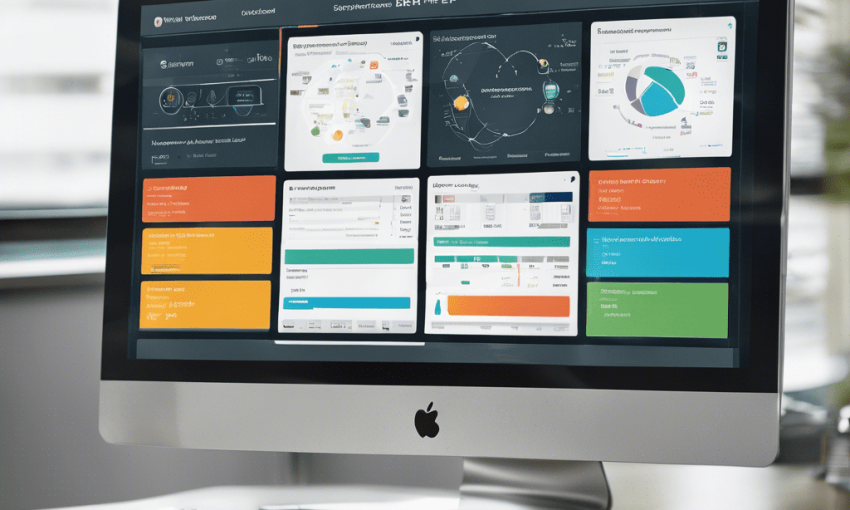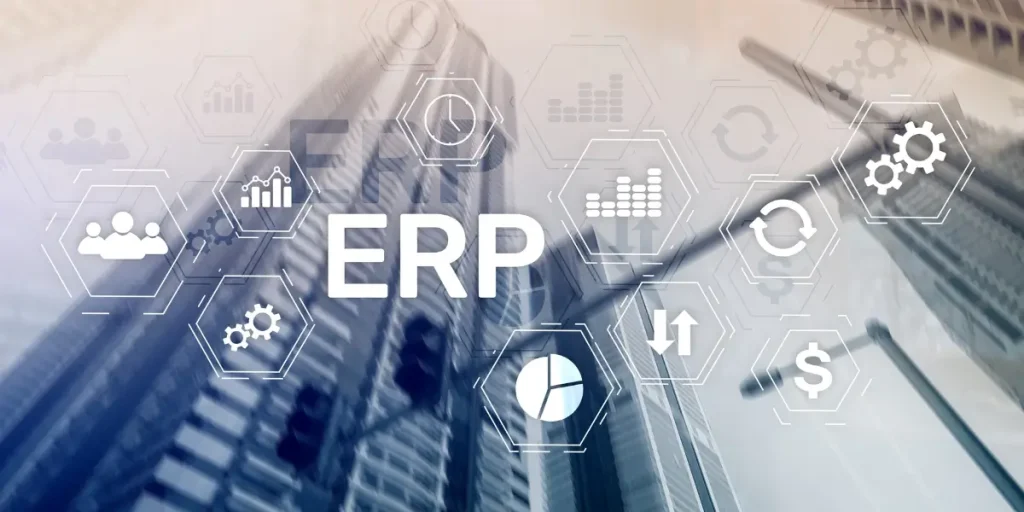
Introduction
An ERP system (Enterprise Resource Planning) is a powerful software solution that enables businesses to manage and integrate core operations such as inventory control, finance, manufacturing, sales, marketing, and human resources through a unified platform.
These integrated applications connect various departments, ensuring a seamless flow of information across all levels of the organization. This article explores the importance, benefits, types, and implementation of ERP systems, along with real-life examples and expert insights.
What is ERP?
Enterprise Resource Planning (ERP) is a type of business management software that consolidates essential processes into one centralized system. Instead of managing multiple disconnected tools, ERP allows companies to operate from a single, real-time database that enhances efficiency and decision-making.
A Brief History of ERP
The roots of ERP trace back to the 1960s with Material Requirements Planning (MRP) systems used for manufacturing and inventory control. In the 1990s, these evolved into modern ERP platforms, expanding beyond production to include finance, HR, supply chain, and customer management.
Today, ERP systems are used across industries—from manufacturing to healthcare and education—empowering organizations of all sizes to operate smarter and faster.

Benefits of an ERP System for Businesses
1. Improved Operational Efficiency
An ERP system automates workflows, reduces manual errors, and streamlines processes. Businesses can optimize resource utilization, reduce lead times, enhance productivity, and deliver better customer service—all contributing to increased profitability.
2. Better Decision-Making Capabilities
ERP provides real-time data, customizable dashboards, and analytics tools. This allows managers to analyze performance, monitor KPIs, and make data-driven decisions that align with business goals.
3. Enhanced Collaboration and Communication
By centralizing data, ERP systems enable smooth collaboration between departments, employees, customers, and suppliers. Shared information and automated workflows ensure everyone is on the same page.
4. Reduced Costs and Risks
ERP minimizes operational, inventory, labor, and administrative costs by improving efficiency. Automation reduces the risk of human error, fraud, and non-compliance, ensuring better control and governance.
Key Features of an ERP System
Modern ERP systems are modular, meaning businesses can choose only the components they need. Here are the most essential modules:
1. Inventory Management
Tracks and manages inventory levels in real time. It helps forecast demand, prevent overstocking or shortages, and optimize supply chain management.
2. Accounting and Financial Management
Manages accounts receivable, payable, cash flow, and reporting. It ensures financial accuracy and compliance with accounting standards.
3. Human Resource Management (HRM)
Automates payroll, recruitment, attendance, and performance evaluations. This saves time and improves workforce management.
4. Supply Chain Management (SCM)
Covers procurement, logistics, and distribution. SCM modules improve delivery timelines and cost efficiency.
5. Customer Relationship Management (CRM)
Tracks customer interactions, sales, and marketing efforts. Helps businesses retain customers and improve loyalty.
6. Project Management
Facilitates planning, execution, and monitoring of projects—ensuring timely delivery and budget control.
Types of ERP Systems
ERP systems vary depending on the size and needs of a business.
ERP for Small Businesses
Simplified and cost-effective ERP solutions that focus on essential functions like inventory, sales, and accounting.
ERP for Mid-Size Businesses
These systems offer more modules and integration options to support growing organizations.
ERP for Large Enterprises
Advanced, scalable ERP systems that handle complex operations, multi-location data, and industry-specific needs.
Industry-Specific ERP Systems
ERP solutions are often customized for different industries such as:
- Manufacturing ERP – Production scheduling and quality control
- Retail ERP – POS, inventory, and customer management
- Healthcare ERP – Patient records and compliance
- Education ERP – Student and faculty management
Cloud vs On-Premises ERP
Cloud ERP
Hosted on remote servers and accessed via the internet. Ideal for small and medium-sized businesses because it’s cost-effective, scalable, and easy to update.
On-Premises ERP
Installed on a company’s own servers, offering greater control and customization, though it requires higher initial investment and maintenance.
Hybrid ERP
A mix of both—some modules are cloud-based while others are hosted locally—offering flexibility for businesses transitioning to the cloud.
ERP Implementation: Key Steps for Success
Implementing an ERP system requires careful planning and expert guidance.
1. The Importance of Planning
Define clear goals, objectives, and project scope. Establish a realistic timeline and budget to minimize disruption during implementation.
2. The Role of an ERP Consultant
An ERP consultant helps select the best system, manage installation, and train employees. Their expertise ensures a smoother and more effective rollout.
Popular ERP Software Solutions
1. SAP ERP
One of the most widely used ERP systems, offering robust modules for finance, HR, production, and analytics. Best for medium to large enterprises.
2. Oracle ERP Cloud
A cloud-based solution with AI, machine learning, and predictive analytics. Ideal for large corporations seeking advanced automation.
3. Microsoft Dynamics 365
A flexible ERP and CRM suite that integrates with Microsoft tools. Suitable for businesses of all sizes.
4. NetSuite ERP
A cloud-first ERP system focused on scalability and real-time visibility, perfect for startups and growing enterprises.

Challenges of ERP Implementation
Despite its benefits, ERP implementation can be complex.
Common challenges include:
- High initial setup costs
- Employee resistance to new systems
- Lengthy integration and training processes
Proper change management and continuous training are essential for success.
ERP for Small Businesses vs. Large Enterprises
While ERP systems were once exclusive to big corporations, today’s solutions are highly customizable and affordable.
- Small businesses can opt for modular, cloud-based ERP systems.
- Large enterprises benefit from fully integrated systems across multiple departments and locations.
The Future of ERP Systems
ERP is evolving rapidly with emerging technologies like Artificial Intelligence (AI), Machine Learning (ML), and Internet of Things (IoT).
Future ERP systems will:
- Automate more routine tasks
- Offer predictive analytics for smarter decisions
- Provide real-time insights across global operations
- Enable mobile and voice-based ERP access
Real-Life ERP Success Stories
ERP in Manufacturing
A global manufacturer integrated ERP to connect production, sales, and inventory—achieving a 20% productivity boost and accurate demand forecasting.
ERP in Retail
A leading retail chain adopted ERP to streamline its supply chain, reducing stock shortages and increasing customer satisfaction.
How to Choose the Right ERP System
- Business size and industry needs
- Deployment type (cloud, on-premise, hybrid)
- Scalability and customization options
- Vendor reputation and customer support
When selecting an ERP system, consider:
Compare providers such as SAP, Oracle, Microsoft Dynamics, Infor, and NetSuite to find the right fit.
Conclusion
In today’s competitive landscape, implementing an ERP system is crucial for long-term growth. From automating processes to improving collaboration and reducing costs, ERP empowers businesses to make data-driven decisions and stay ahead of the competition.
Whether you’re a small business or a large enterprise, investing in ERP can redefine your operations, boost efficiency, and accelerate success.
FAQs
1. What is the difference between ERP and CRM?
ERP manages all core business processes, while CRM focuses specifically on customer relationships and sales management.
2. How long does it take to implement an ERP system?
Depending on company size and complexity, implementation can take 3 to 12 months on average.
3. Can small businesses benefit from ERP?
Absolutely. Many vendors offer affordable, cloud-based ERP systems tailored for small businesses.
4. What is the typical cost of ERP software?
ERP costs vary widely—from $5,000 for small systems to over $1 million for enterprise-level implementations.
5. Is ERP only for large corporations?
No. Modern ERP software is designed for businesses of all sizes, offering modular and scalable options.





